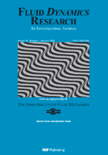
FLUID DYNAMICS RESEARCH
Scope & Guideline
Unveiling the Complexities of Fluid Behavior
Introduction
Aims and Scopes
- Theoretical Fluid Dynamics:
Research in this area includes the development and analysis of mathematical models and theories that describe fluid motion, including turbulence, stability, and wave phenomena. - Numerical Simulations:
The journal publishes studies employing various numerical methods to solve fluid dynamics problems, such as Computational Fluid Dynamics (CFD), Lattice Boltzmann methods, and Direct Numerical Simulations (DNS). - Experimental Fluid Mechanics:
Papers often report experimental findings that validate theoretical models or numerical predictions, exploring phenomena like flow visualization, drag reduction, and fluid-structure interactions. - Interdisciplinary Applications:
Fluid Dynamics Research explores the application of fluid mechanics in various fields, including biomedical engineering, environmental science, and energy systems, showcasing how fluid dynamics principles can solve real-world problems. - Complex Fluid Behavior:
The journal addresses the behavior of complex fluids, such as non-Newtonian fluids, multiphase flows, and nano-fluids, focusing on their unique properties and behaviors under different flow conditions.
Trending and Emerging
- Machine Learning in Fluid Dynamics:
An increasing number of studies apply machine learning techniques to analyze fluid flow data, optimize simulations, and develop predictive models, indicating a trend towards integrating artificial intelligence in fluid mechanics. - Multiphase and Complex Fluid Flows:
There is a growing emphasis on studying multiphase flows and complex fluids, such as colloids, emulsions, and nanofluids, which are critical in various industrial and biomedical applications. - Fluid-Structure Interaction:
Research on the interaction between fluids and structures has gained traction, with studies focusing on how fluid dynamics affects structural integrity, especially in biomedical applications and aerospace engineering. - Environmental Fluid Dynamics:
An increasing number of papers address environmental applications, including pollutant dispersion, climate modeling, and renewable energy systems, reflecting a broader concern for sustainability and environmental impact. - Advanced Numerical Techniques:
There is a trend towards the development and application of novel numerical methods, such as high-order methods and hybrid approaches, to solve increasingly complex fluid dynamics problems.
Declining or Waning
- Low Reynolds Number Flows:
Research focused on low Reynolds number fluid flows appears to be decreasing, possibly due to a shift towards more complex fluid dynamics phenomena or higher Reynolds number applications that have broader implications in engineering and technology. - Traditional Turbulence Models:
There has been a notable reduction in studies dedicated to classical turbulence modeling approaches, such as simple k-ε models, as the field moves towards more sophisticated, data-driven, and machine learning-based turbulence modeling techniques. - Static Fluid Analysis:
Papers centered solely on static fluid analysis or equilibrium states have waned, indicating a preference for dynamic studies that encompass transient phenomena and time-dependent behaviors in fluid systems.
Similar Journals

Physical Review Fluids
Transforming Theories into Practical ApplicationsPhysical Review Fluids is an esteemed journal published by the American Physical Society, focusing on the intricate and essential field of fluid dynamics. With an impressive Q1 ranking in categories such as Computational Mechanics, Fluid Flow and Transfer Processes, and Modeling and Simulation, this journal serves as a pivotal resource for researchers and professionals seeking to disseminate high-quality and innovative research findings. The journal's scope encompasses a broad spectrum of topics within fluid mechanics, promoting advancements in theoretical, computational, and experimental methodologies. Although it is not an open-access journal, its publications are critically well-received, underpinned by its strong standing in the Scopus rankings which place it in the top percentiles across various relevant fields. Physical Review Fluids has been a foundational platform for scholars to share their discoveries from 2016 through 2024, making it an indispensable asset in the ongoing evolution of fluid dynamics research.
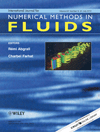
INTERNATIONAL JOURNAL FOR NUMERICAL METHODS IN FLUIDS
Transforming Fluid Flow Challenges into Numerical TriumphsINTERNATIONAL JOURNAL FOR NUMERICAL METHODS IN FLUIDS, published by Wiley, has established itself as a leading platform for cutting-edge research in the fields of applied mathematics, computational mechanics, computer science applications, and mechanical engineering. With its ISSN 0271-2091 and E-ISSN 1097-0363, this journal is committed to disseminating high-quality, peer-reviewed articles that contribute to the advancement of numerical methodologies in fluid dynamics. Boasting a commendable 2023 impact factor that places it in the second quartile across multiple relevant categories, it provides insights into significant research dimensions that engage an audience of researchers, professionals, and students keen on the computational challenges of fluid flow. The journal's broad scope encompasses foundational and applied research, encouraging the exploration of new numerical techniques and algorithms. As an invaluable resource based in the United Kingdom, INTERNATIONAL JOURNAL FOR NUMERICAL METHODS IN FLUIDS remains dedicated to providing insights and fostering innovation in its domain, with a consistent publication history spanning from 1981 to 2024.
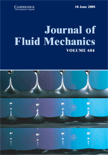
JOURNAL OF FLUID MECHANICS
Exploring the depths of fluid phenomena.JOURNAL OF FLUID MECHANICS, published by Cambridge University Press, is a premier international journal recognized for its significant contributions to the field of fluid dynamics. With an esteemed impact factor that places it in the Q1 category across multiple disciplines, including Applied Mathematics, Condensed Matter Physics, Mechanical Engineering, and Mechanics of Materials, this journal serves as a vital resource for researchers and practitioners alike. Established in 1956, it provides a platform for innovative and high-quality research articles that advance the understanding of fluid mechanics phenomena. The journal's rankings underscore its prestige, with Scopus recognizing it among the top journals in its category. Although it currently does not offer open access, the journal remains accessible to educational institutions and professionals in the United Kingdom and beyond. By addressing critical and emerging topics in fluid mechanics, JOURNAL OF FLUID MECHANICS is essential for those striving to push the boundaries of knowledge and application in this dynamic field.

EXPERIMENTS IN FLUIDS
Advancing fluid dynamics through rigorous experimentation.EXPERIMENTS IN FLUIDS is a prestigious journal in the field of fluid mechanics, published by SPRINGER, renowned for its rigorous peer-reviewed research and experimental studies that advance the understanding of fluid behavior in various contexts. With an ISSN number of 0723-4864 and an E-ISSN of 1432-1114, this journal has published influential works since its inception in 1983, maintaining a convergence of data and insights crucial for both academia and industry. Its impressive impact factor and ranking in the Q1 category for Computational Mechanics, Fluid Flow and Transfer Processes, Mechanics of Materials, and Physics and Astronomy underscore its significance in fostering high-quality research in these domains. Researchers and professionals benefit from the comprehensive access to experimental methodologies, innovative applications, and cutting-edge results that the journal provides without the Open Access model. The journal's offices located in New York, USA, facilitate its global outreach, making it an essential resource for scholars and practitioners seeking to deepen their expertise in fluid dynamics and related fields.

Journal of Fluid Science and Technology
Exploring Innovations in Fluid MechanicsThe Journal of Fluid Science and Technology, published by the Japan Society of Mechanical Engineers, serves as a pivotal platform for the dissemination of cutting-edge research in the fields of fluid mechanics and mechanical engineering. With an ISSN of 1880-5558, this Open Access journal has been dedicated to advancing the understanding of fluid flow and transfer processes since its establishment. As of 2023, it holds a significant position with a Q3 quartile ranking in both Fluid Flow and Transfer Processes and Mechanical Engineering categories. Researchers and practitioners are encouraged to explore the journal’s extensive collection of articles, contributing to the body of knowledge that impacts various practical applications in engineering and technology. The journal, which has established a reputation for quality amidst a competitive landscape, further fosters international collaboration and education by providing unrestricted access to its content. For professionals and students alike, the Journal of Fluid Science and Technology represents an invaluable resource for the latest findings and innovations in fluid dynamics and mechanical systems.

Interfacial Phenomena and Heat Transfer
Exploring the Dynamics of Heat Transfer and InterfacesInterfacial Phenomena and Heat Transfer is a leading academic journal published by BEGELL HOUSE INC that has rapidly established itself as an essential resource for scholars and industry experts in the fields of engineering, fluid flow, and chemical processes. With an ISSN of 2169-2785 and E-ISSN 2167-857X, this journal focuses on the critical interdisciplinary aspects of heat transfer and interfacial phenomena, offering insights that span across mechanical engineering, chemical engineering, and physical sciences. Despite its relatively recent inception in 2017, it has garnered respectable recognition, with a 2023 Scopus rank placing it in the Q3 category within the disciplines of Engineering (miscellaneous) and Fluid Flow and Transfer Processes, making it a pertinent publication for those interested in cutting-edge research. As researchers and professionals navigate the complexities of interfacial dynamics, Interfacial Phenomena and Heat Transfer serves as a pivotal platform, publishing high-quality, peer-reviewed articles that aim to advance knowledge and stimulate further investigation in this increasingly vital domain.

MECCANICA
Exploring the Frontiers of Condensed Matter and MechanicsMECCANICA, an esteemed journal published by Springer, stands at the forefront of research in the fields of Condensed Matter Physics, Mechanical Engineering, and Mechanics of Materials. Established in 1966 and continuing through 2024, this journal provides a robust platform for the dissemination of innovative research and advancements in these increasingly interconnected domains. With an impressive 2023 ranking placing it in the Q2 category across multiple fields, MECCANICA boasts a Scopus rank of #198 in Mechanical Engineering, #150 in Condensed Matter Physics, and #141 in Mechanics of Materials, highlighting its significance and influence within the scholarly community. The journal aims to foster dialogue among researchers, professionals, and students, facilitating the exchange of cutting-edge ideas and methodologies crucial for overcoming contemporary engineering and physics challenges. Readers can access a wealth of knowledge through its comprehensive articles, and while it does not currently offer open access, the journal remains instrumental in shaping the future of engineering and physical sciences.
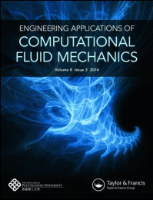
Engineering Applications of Computational Fluid Mechanics
Pioneering Solutions in Fluid Mechanics ApplicationsEngineering Applications of Computational Fluid Mechanics is an esteemed journal published by Taylor & Francis Ltd that serves as a vital resource for researchers, professionals, and students in the field of fluid mechanics and its computational applications. With an ISSN of 1994-2060 and an E-ISSN of 1997-003X, this journal has established its reputation through its rigorous peer-review process and commitment to Open Access since 2015, facilitating widespread dissemination of cutting-edge research. Based in the United Kingdom, the journal is indexed in leading databases and has achieved a significant impact in its categories, ranking in the top quartile (Q1) for both Computer Science (miscellaneous) and Modeling and Simulation as of 2023. Notably, its Scopus rankings place it in the top 4% of Mathematics/modeling and simulation, highlighting its importance in advancing knowledge and innovation within the discipline. The journal invites contributions that explore both theoretical and practical aspects of computational fluid dynamics, fostering collaboration and intellectual growth within the community.
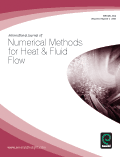
INTERNATIONAL JOURNAL OF NUMERICAL METHODS FOR HEAT & FLUID FLOW
Exploring Cutting-Edge Research in Computational Mechanics.INTERNATIONAL JOURNAL OF NUMERICAL METHODS FOR HEAT & FLUID FLOW, published by EMERALD GROUP PUBLISHING LTD, is a premier platform dedicated to advancing the field of numerical methods applied to heat and fluid flow analysis. With an ISSN of 0961-5539 and an E-ISSN of 1758-6585, this journal has been a vital resource since its inception in 1991, covering cutting-edge research right up to 2024. It is highly regarded within various disciplines, as evidenced by its impressive ranking in the 2023 Scopus categories, which places it in the Q1 tier for Computational Mechanics and a Q2 tier for Aerospace Engineering and Mechanical Engineering. This authoritative journal holds significant importance for researchers, professionals, and students who are keen on expanding their knowledge and addressing challenges in thermal and fluid dynamics through innovative computational techniques. Although the journal does not provide Open Access options, its rigorous peer-review process and high-impact publication standards ensure that it remains an essential tool for those involved in engineering advancements and applied mathematics.

Experimental and Computational Multiphase Flow
Elevating Standards in Fluid Flow and Transfer ProcessesExperimental and Computational Multiphase Flow, published by SpringerNature, is a prestigious academic journal that critically examines advancements in the field of fluid dynamics, with a specialized focus on multiphase flow phenomena. Since its inception in 2019, the journal has established a remarkable reputation, attaining Q1 status in Fluid Flow and Transfer Processes as well as Mechanical Engineering according to the 2023 category quartiles, reflecting its high impact and relevance in these domains. With Scopus rankings placing it among the top 15 journals in both Chemical Engineering and Nuclear Energy and Engineering, Experimental and Computational Multiphase Flow is an essential resource for researchers, professionals, and students engaged in cutting-edge studies and applications. Although it operates on a subscription model, the journal remains dedicated to disseminating high-quality research and fostering a deeper understanding of complex fluid interactions across various scientific disciplines. By prioritizing innovative methodologies and interdisciplinary collaborations, the journal aims to significantly contribute to the ongoing evolution of multiphase flow research, recognizing its critical importance in engineering and energy sectors.